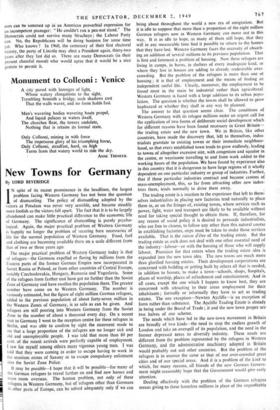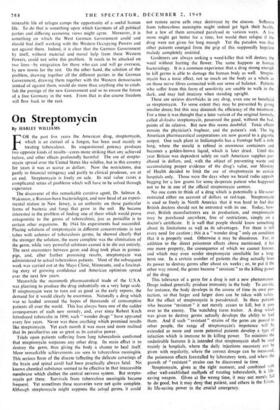New Towns for Germany
Ry LORD BEVERIDGE IN spite of its recent prominence in the headlines, the largest problem facing Western Germany has not been the question of dismantling. The policy of dismantling adopted by the % ictors at Potsdam was never very sensible, and became steadily more foolish as the victors fell apart. The fact that it is to be largely abandoned can make little practical difference to the economic life of Germany. The significance of dismantling is purely psycho- logical. Again, the major practical problem of Western Germany is happily no longer the problem of securing bare necessaries' of life for the normal population of Western Germany. Food, fuel and clothing are becoming available there on a scale different from that of two or three years ago.
The major practical problem of Western Germany today is that of refugees—the Germans expelled or fleeing by millions from the Eastern parts of the former German Empire now incorporated in Soviet Russia or Poland, or from other countries of Central Europe, notably Czechoslovakia, Hungary, Rumania and Yugoslavia. Some of the refugees from farther east have got no farther than the Soviet Zone of Germany and have swollen the population there. The greater number have come on to Western Germany. The number is variously estimated, but the figure of eight million German refugees, added to the previous population of about forty-seven million in the Western Zones of Germany, is as safe as can be given. And refugees are still pouring into Western Germany from the Soviet Zone to the number of about a thousand every day. On a recent visit to Germany I went to the reception centre for these refugees in Berlin, and was able to confirm by sight the statement made to me that a large proportion of the refugees are no longer sick and old and unemployable people. I was told that more than 80 per cent. of the recent arrivals were perfectly capable of employment. I saw for myself among others many vigorous young men. I was told that they were coming in order to escape having to work in the uranium mines of Saxony or to escape compulsory enlistment into the Soviet Zone Police.
It may be possible—I hope that it will be possible—for many of the German refugees to travel farther on and find new homes and more room overseas. The human problem, not only of these refugees in Western Germany, but of refugees other than Germans in other parts of Europe, can be solved adequately only if we can
bring about throughout the world a new era of emigration. But it is idle to suppose that more than a proportion of the eight million German refugees now in Western Germany can move out in this way. It is as idle to hope, as many of them still hope, that they will in any measurable time find it possible to return to the homes that they have lost. Western Germany faces the necessity of absorb- ing an addition of several millions to its previous population. That is first and foremost a problem of housing. Now these refugees are living in camps, in barns, in shelters of every inadequate kind, or where they live in houses are adding to already undesirable over- crowding. But the problem of the refugees is more than one of housing ; it is that of employment and the means of finding an independent useful life. Clearly, moreover, the employment to be found must in the main be industrial rather than agricultural. Western Germany is faced with a large addition to its urban popu- lation. The question is whether the towns shall be allowed to grow haphazard or whether they shall in any way be planned.
The answer to that question seems clear. The conditions of Western Germany with its refugee millions make an urgent call for the application of two forms of deliberate social development which for different reasons have been found necessary in Great Britain— the trading estate and the new town. We in Britain, like other countries, have made the discovery that, left to themselves, indus- trialists gravitate to existing towns or their immediate neighbour- hood, so that every established town tends to grow endlessly, leading to towns of altogether excessive size, with congestion and squalor in the centre, or wearisome travelling to and from work added to the working hours of the population. We have found by experience also in this country that it is dangerous to have large regions of it wholly dependent on one particular industry or group of industries. Further, that if those particular industries contract and become centres of mass-unemployment, this, so far from attracting other new indus- tries there, tends normally to drive them away.
The trading estate is a reaction to the experience that left to them- selves industrialists in placing new factories tend naturally to place them in, or on the fringes of, existing towns, where services such as power, light, water and transport are likely to be available without need for taking special thought to obtain them. If, therefore, for any reason of social policy it is desired to persuade industrialists, who are free to choose, to follow any other than this natural course in establishing factories, steps must be taken to make those services available. That is the raison deire of the trading estate. But the trading estate as such does not deal with one other essential need of the industry—labour—or with the housing of those who will supply labour. Provision for that enters when the trading estate idea is expanded into the new town idea. The new towns are much more than glorified housing estates. Their development corporations are concerned with building or getting built by others all that is needed, in addition to houses, to make a town—schools, shops, hospitals, places of worship, places of refreshment and entertainment. And in all cases, except the one which I happen to know best, they are concerned with attracting to their areas employment for their inhabitants ; formally or informally they have to act as trading estates. The one exception—Newton Aycliffe—is an exception of form rather than substance. The Aycliffe Trading Estate is already in being under the Board of Trade ; it and the new town proper are two halves of one scheme.
The needs which have led to the new-town movement in Britain are broadly of two kinds—the need to stop the endless growth of London and take an overspill of its population, and the need in the former depressed areas to diversify industry. These needs arc different from the problem represented by the refugees in Western Germany, and the administrative machinery adopted in Britain would probably not suit other countries. But the problem of the refugees is in essence the same as that of our over-crowded great cities and of our special areas. And it is a problem of the kind to which, for many reasons, all friends of the new German Govern- ment might reasonably hope that the Government would give early attention.
Dealing effectively with the problem of the German refugees means giving to these homeless millions in place of the unprofitable miserable life of refugee camps the opportunity of a useful human life. To do that is something upon which Germans of all political parties and differing economic views might agree. Moreover, it is something on which the West German Government could and should find itself working with the Western Occupying Powers and not against them. Indeed, it is clear that the German Government by itself, without material and moral help from these Western Powers, could not solve this problem. It needs to be attacked on two lines—by emigration for those who can and will go overseas, by new towns for the rest. On the other hand, the solution of the problem, drawing together all the different parties in the German Government, drawing them together with the Western democracies instead of against them, would do more than anything else to estab- lish the prestige of the new Government and so to ensure the future of a free Germany in the west. From that in due course freedom will flow back to the east.



































 Previous page
Previous page